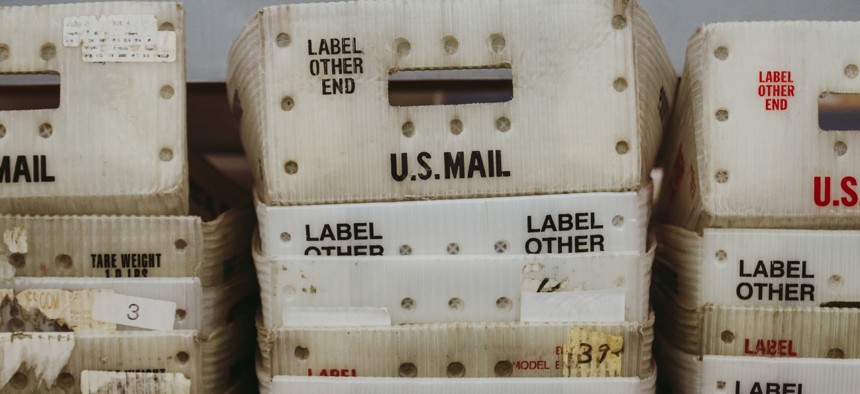
gradivis / istock
Postal Service Blames ‘Street Crime’ and Absenteeism for Mail Delays
Lawmakers are looking to make it harder for the agency to slow delivery in the future, while auditor says fixing current problems will be a significant challenge.
Just weeks after the U.S. Postal Service implemented new standards to slow a significant portion of mail delivery, Democrats in Congress are on the verge of proposing legislation to create additional barriers for management before it can take similar actions in the future.
Lawmakers blasted the reforms implemented by Postmaster General Louis DeJoy at a hearing of the House Oversight and Reform Committee’s panel on Government Operations that took place in Chicago on Friday, calling them harmful to the mailing agency and suggesting they were part of an intentional effort to undermine it. They similarly criticized USPS for ongoing failures to deliver mail on time, which has improved in recent months but remains below the agency’s targets.
Eddie Morgan, USPS’ postmaster in Chicago, which has been among the worst hit cities by the delays, blamed a rise in “street crime” and its impact on recruiting and retention. USPS has enough employees on the rolls, Morgan said of his region, but an insufficient number are actually showing up to work. He explained he is working to purge the agency’s rolls of employees with significant unexcused absences and to fill resulting vacancies.
Rep. Carolyn Maloney, D-N.Y., who chairs the larger oversight committee, said she will soon introduce a bill to require postal management to conduct testing on its nationwide delivery standard changes. DeJoy’s recent changes impacted about 40% of First-Class mail, expanding the maximum time for delivery from three days to five. Postal management conceded they had not examined the impact of the proposed changes on rural versus urban populations, low income communities or elderly communities, nor had they solicited feedback on the changes from customers. The Postal Regulatory Commission, in reviewing the plan earlier this year, faulted USPS for failing to pilot test its slowdowns and creating projections it could not prove would be realized.
Maloney’s forthcoming legislation would empower the commission to pause such changes from taking place until it can review testing. It would also require a two-thirds vote from the postal board of governors to approve service standard revisions that had not been tested. Maloney has also sponsored bipartisan postal reform legislation that the oversight committee has approved but has yet to receive a vote on either the House or Senate floor.
“Hopefully we can bring postal reform to the floor soon,” said Rep. Gerry Connolly, D-Va., who chaired Friday’s hearing.
House Democrats originally sought to stymie DeJoy’s efforts to implement the mail slowdowns in that postal reform legislation, but ultimately stripped the language from the measure to win bipartisan backing.
Connolly said the delays in Chicago were not anomalous and that Congress could not allow them to continue. He added he hoped to see a change in “the governance of the Postal Service to ensure we have a board of governors and a postmaster general who are, in fact, dedicated to the mission.” Lawmakers throughout the hearing said their offices have been inundated with complaints from constituents about mail issues. They cited a decision by management to start letter carriers on their routes later in the day as partially responsible for the problems.
Rep. Fred Keller, R-Pa., the lone Republican to attend the hearing, sought to shift blame away from DeJoy, arguing mail delays predated his tenure and worsened as a result of the COVID-19 pandemic. On-time performance quickly plummeted after DeJoy took office, which the postmaster general has conceded was largely due to operational reforms he implemented. USPS has since rolled those back and, like Morgan, the Chicago postmaster, has said ongoing delays are due to employee absenteeism and other fallout from the pandemic. The Postal Service has restored service to pre-DeJoy levels and saw further improvement in the most recent quarter that ended just before the new service windows went into effect.
Lawmakers and a National Association of Letter Carriers official who testified at the hearing noted a recent inspector general report that found USPS frequently undercounted its late and undelivered mail. USPS numbers are not always accurate, said Mack Julion, the NALC representative, as front-line supervisors “provide misleading reports to appease upper management.”
Melinda Perez, an auditor in the USPS inspector general's office, said the agency's problems include staffing shortages, packages and mail going to the wrong facilities and mail not being pre-sorted when it arrives at post offices.
“USPS has plans to address these concerns, however implementing multiple initiatives to correct these issues will be challenging, especially now as the Postal Service is addressing its peak season,” Perez said, adding her office will soon release a report on USPS’ readiness for the holidays.
The Postal Service experienced unprecedented delays during the holiday season in 2020, with DeJoy eventually admitting the agency “missed our service standards by far and disappointed the nation.”







